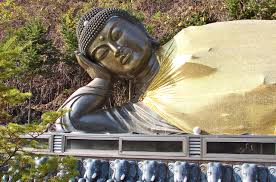Buddhism is a religion that was founded in India in the sixth century BC by Siddhartha Gautama, known as the Buddha.
The Buddha is not a God, or a messenger of God, and cannot act as a savior or redeemer. It is the Buddha’s teachings, known as Dhamma, that is at the core of Buddhism.
The Four Noble Truths
Central to Buddhism are the Four Noble Truths, they are Buddha’s basic teaching, encapsulating the entire Buddhist path and they are as follows.
1. The Noble Truth of Suffering
There is no doubt that we will all suffer during our lives.
2. The Noble Truth of the Cause of Suffering
It is believed that suffering emerges from attachment to living beings and inanimate objects.
3. The Noble Truth of the Cessation of Suffering
The Buddha taught us that to end suffering, we must become detached from others and our belongings.
4. The Noble Truth of the Path that Leads to the Cessation of Suffering
Ultimate Buddism Goal
The ultimate goal of Buddhism is the cessation of all suffering, and this is referred to as Nirvana. It is believed that Nirvana can be achieved by following the Noble Eightfold Path. This is divided into three parts. The first being Shila; this concentrates on morality and includes:
1. Right Speech.
We should speak the truth and refrain from malicious gossip.
2. Right Action.
We must do no evil and treat all living beings within the world with respect and kindness. We ought not to seek revenge for what we believe to be ill deeds.
3. Right Livelihood.
We should partake in honest and ethical employment.
The second part of the Noble Eightfold Path is known as Samadhi, this is the meditative aspect, and like Shila, is divided into three parts.
4. Right Effort.
This refers to maintaining the health of our bodies, and it teaches the importance of physical exercise and a nutritious diet.
5. Right Mindfulness.
This addresses the connotations surrounding detrimental issues, for example, physical cravings and negative emotions such as jealousy, rage, and hatred.
6. Right Concentration.
This advocates meditation. It is deemed as necessary to clear the mind and balance the emotions. Therefore we can gain peace and accomplish the ultimate goal of Nirvana.
The final part of the Noble Eightfold Path is Prajna, and this relates to wisdom. Prajna has two steps.
7. Right, Understanding.
We need to achieve a true understanding of the Four Noble Truths.
8. Right Thoughts.
This is the pure desire to be free of attachment, and therefore achieve the cessation of suffering and reach Nirvana.
Central to Buddhism are the concepts of Karma and Reincarnation. It is believed that all of our actions will determine what will occur in the future, both in this life and in lives to come; this is the concept of Karma. The Buddha taught us that we are all responsible for our own Karma.
There are many schools of thought in Buddhism. Ideas and beliefs differ within various parts of the world; however, all Buddhists accept the Buddha as a teacher, believe in the Four Noble Truths, and strive to live by The Noble Eightfold Path.





